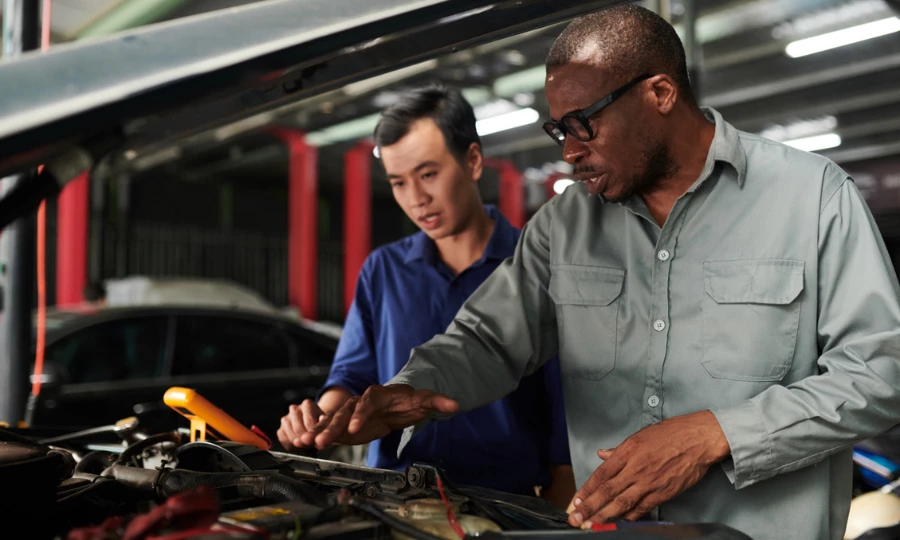Get this deal! Call now.
Speak with a vehicle protection plan specialist and get $300 off any new contract instantly.
Call 866-678-4172
or scan the code below


Start a conversation about long-lasting cars, and Toyota will undoubtedly be part of the discussion. This automaker has come a long way from exporting small and cheap cars to the U.S. almost 70 years ago. Today, according to Statista, Toyota is the world’s largest automaker by volume.
This growth didn’t happen by accident. Over the decades, the company built a reputation for selling durable and reliable vehicles – Toyotas consistently dominate the “250,000-mile club.” A recent unscientific look at the iSeeCars.com marketplace shows 4,600 cars with at least 250,000 miles on their odometers. Of these, 686 wear a Toyota badge. Among Japanese brands, Honda came in a distant second with 388 high-mileage examples.
The 250,000-mile club isn’t an official designation but a milestone of exceptional vehicle longevity. Not many cars make it this far. Keep reading as we explore why Toyotas often reach this benchmark, how dependability saves car owners money, and what Toyota models lead the pack.
Toyota’s success comes from building durable, high-quality vehicles that can go the distance. This approach doesn’t involve promises or marketing slogans but focuses on design and manufacturing.
Toyota’s use of robust, time-tested components is at the core of this methodology and the resulting long-term reliability of its cars. For instance, many Toyota models use timing chains instead of timing belts on brand-new vehicles. A timing chain usually lasts the engine’s lifetime, while a timing belt needs replacement every 60,000 to 100,000 miles. In addition, a failed timing chain or belt can lead to catastrophic engine failure in most cars. So, going with the more durable option reduces the chance of expensive repairs in the first place.
Another example involves Toyota’s reduced reliance on turbochargers. Turbocharging helps maximize engine power but can add extra stress, making it another component that can become a trouble spot. While some Toyota performance vehicles use turbochargers, mainstream models like the Camry and most Corollas have avoided this technology.
Similarly, Toyota keeps it simple when it comes to transmissions. Ten-speed units hit the market in 2017 to improve performance and fuel efficiency, but some automakers have stumbled with these complex gearboxes, causing reliability issues. Toyota took a slower and more steady approach, gradually introducing ten-speed transmissions in select models. This gradual rollout helped engineering and manufacturing catch up to the technology.
Toyota gets criticized for not being the most innovative manufacturer, but sticking with what works aids in dependability. BMWs are technology-laden vehicles with engaging driving characteristics, but these advancements come at a price. RepairPal rates the German automaker 30th out of 32 brands for reliability. In contrast, Toyota ranks eighth.
Toyota’s reputation for reliability isn’t just about using durable parts but also how those parts work together. The company dedicates significant resources to maintaining quality control and high manufacturing standards. This happens through the Toyota Production System (TPS), which emphasizes continuous improvement and waste reduction. The net result of the TPS are vehicles that improve over time while staying affordable.
Toyota’s engineering philosophy also focuses on designing vehicles for consistent performance over time. This means a car will operate just as well in the future as it does when leaving the factory. For example, Toyota engineers its powerplants to have greater tolerances between moving parts, translating into fewer problems over hundreds of thousands of miles.
We’ll skip the technical details (here’s an in-depth MotorTrend article on the subject), but this approach significantly reduces the risk of significant mechanical failures. The trade-off can be a less refined and less powerful engine, but the average Camry or Corolla owner is more concerned with getting from Point A to Point B than extra horsepower or torque.
Engineering also plays a role in Toyota’s hybrid technology. What started as a novelty a quarter of a century ago with the then-quirky Prius has transformed into a significant shift in automotive powerplants. Over the past two-plus decades, Toyota has worked to ensure its hybrid vehicles are just as reliable as ones with conventional engines. In fact, a 2023 Consumer Report survey revealed that hybrids have 26% fewer problems than standard gas vehicles, with many Toyotas contributing to these findings.
Toyota is so confident in its hybrid technology that the Sienna minivan became hybrid-only in 2021, and the all-new, ninth-generation Camry only has a hybrid engine under the hood.
One of the reasons Toyotas frequently make it to the 250,000-mile club is their reputation for low maintenance costs. Theoretically, any car can be kept on the road with an unlimited repair budget, but the reality is that some repairs (such as engine or transmission work) can cost more than an older car is worth. In this situation, an affected vehicle usually finds a final parking space at a junkyard.
A YourMechanic study confirms that Toyotas are less expensive to maintain. Toyota owners spent an average of $5,500 over ten years to keep their cars on the road, lower than the 29 other car brands analyzed. The most expensive? BMW, with a ten-year service tab of $17,800. Drilling further into the details, the Toyota Prius was the cheapest to own, with a 10-year repair and maintenance average of $4,300.
Several factors contribute to Toyota’s low maintenance costs:
These factors add to generally less-expensive repairs for Toyotas. Using a Toyota Camry as an example, let’s look at how much specific components cost compared to other sedans. The amounts are based on RepairPal-supplied estimates, including labor:
| Car Part | Toyota Camry | Volkswagen Passat | BMW 328i |
| Alternator | $470 to $663 | $735 to $1,326 | $681 to $1,008 |
| Power Steering Pump | $465 to $632 | $498 to $934 | $619 to $1,474 |
| Radiator | $717 to $855 | $1,284 to $1,512 | $1,031 to $1,232 |
 The best way to keep your Toyota on the road longer and for the least amount of money is obvious: regular maintenance. These steps include:
The best way to keep your Toyota on the road longer and for the least amount of money is obvious: regular maintenance. These steps include:
Reliability is not a hit-or-miss affair with different Toyota models. All Toyotas have a generally good reputation for dependability. A 2024 study by iSeeCars.com identified the top 30 vehicles most likely to reach 250,000 miles or more, and, unsurprisingly, Toyotas occupied nine slots, including the top five. If the sole Lexus, the GX SUV, is added to the list, Toyota can claim one-third of the spots.
The Toyota Tundra pickup received top honors as one of the longest-lasting vehicles, with a 36.6% chance of joining the 250,000-mile club. Second place was earned by the Sequoia SUV at 36.4%, followed by another SUV, the 4Runner, at 26.8.% The Tacoma pickup and Highlander Hybrid SUV rounded out the top five.
You may have noticed a pattern among the potential high-mileage favorites: they’re either SUVs or trucks. These results make sense, as these vehicles are built to more robust standards because they’re frequently used to haul heavy payloads or pull trailers. Automakers recognize this, often adding elements to help manage the extra loads, like more robust suspension components or heavy-duty cooling systems.
Yet these beefier standards didn’t exclude other Toyotas from iSeeCars’ longevity list. The Avalon, Highlander, Camry, and Prius also made the top-30 cut. Overall, Toyotas have a 17% chance of reaching 250,000 miles or more. Honda came in second at 13.6%
The fact that longevity isn’t limited to a single Toyota model or body style reinforces the company’s reputation for reliability. This is a critical reason why Toyotas, especially older ones, are always in demand.
While Toyotas are known for their reliability, no vehicle is immune from breakdowns, especially when approaching high mileage. An extended car warranty (also known as an auto protection plan or vehicle service contract) can provide essential peace of mind, a must-have for car owners without the benefit of a factory warranty.
Endurance offers programs for Toyotas (and most other brands) that protect against mechanical issues that might otherwise leave owners with headaches and significant repair bills. Affordable powertrain coverage safeguards the engine, transmission, and drive axles, often the systems with high service costs.
Expanded programs protect other vital areas, such as the electrical system, suspension, steering, air conditioning, and cooling system. Many car owners opt for Endurance Supreme coverage, which is similar to a new car bumper-to-bumper warranty. Endurance also offers tailored converge for high-mileage or commercial-use Toyotas.
Endurance auto protection plans go beyond just covering repairs; all customers enjoy comprehensive benefits:
In addition, all plan holders are eligible for a free year of Elite Benefits. Just pay a small enrollment fee for access to tire repair and replacement services, key fob replacement, collision repair discounts, and total loss protection.*
Learn how to protect your Toyota and other cars with Endurance auto protection. Visit our online store for instant price and plan details, or request a FREE quote. Call (800) 253-8203 for personalized help from an Endurance plan advisor.
Check out our blog for a vast library of articles on car care for Toyotas, Fords, Chevrolets, Nissans, and more, as well as extended warranty reviews and other valuable topics.

We're here to make sure you get the most comprehensive EV protection. That's why we've partnered with Xcelerate Auto to offer you transparent and dependable Tesla coverage.
Want us to contact you about XCare coverage for your Tesla?



Call for $300 off any new plan!
By clicking the button, you consent to Endurance using automated technology to call, email, and text you using the contact info above, including your wireless number, if provided, regarding auto protection or, in California, mechanical breakdown insurance. You also agree to the Endurance Privacy Policy and Terms and Conditions. Consent is not a condition of purchase, and you can withdraw consent at any time. Message and data rates may apply.
Speak with a vehicle protection plan specialist and get $300 off any new contract instantly.
Call 866-678-4172
or scan the code below



Simply fill out the information below and we will follow up fast with your free no-obligation quote.
By clicking the button, you consent to Endurance using automated technology to call, email, and text you using the contact info above, including your wireless number, if provided, regarding auto protection or, in California, mechanical breakdown insurance. You also agree to the Endurance Privacy Policy and Terms and Conditions. Consent is not a condition of purchase, and you can withdraw consent at any time. Message and data rates may apply.

To speak to a vehicle protection plan specialist and save $300
Scan the code below
As both an Army Veteran & ASE Certified repair shop owner, Andrew has made educating the modern driver an ongoing mission since the opening of his repair shop, Midwest City Autospa, in 2012. Read more about Andrew.